 We Need Diverse Books' inaugural Stories Save Lives event, celebrating 10 years of the Walter Awards and of WNDB, was held at the Whittemore House in Washington, D.C., Thursday, April 10. Featured speakers included Massachusetts Seventh Congressional District Representative Ayanna Pressley, Pulitzer Prize-winning journalist and author Nikole Hannah-Jones, National Book Award-winning author Jacqueline Woodson, and Newbery Medalist Jason Reynolds. Several Walter Award winners were also in attendance--including Elizabeth Acevedo and Angeline Boulley--as was 2023 Newbery Medalist Amina Luqman-Dawson and Christopher Myers, Walter Dean Myers's author/illustrator son.
We Need Diverse Books' inaugural Stories Save Lives event, celebrating 10 years of the Walter Awards and of WNDB, was held at the Whittemore House in Washington, D.C., Thursday, April 10. Featured speakers included Massachusetts Seventh Congressional District Representative Ayanna Pressley, Pulitzer Prize-winning journalist and author Nikole Hannah-Jones, National Book Award-winning author Jacqueline Woodson, and Newbery Medalist Jason Reynolds. Several Walter Award winners were also in attendance--including Elizabeth Acevedo and Angeline Boulley--as was 2023 Newbery Medalist Amina Luqman-Dawson and Christopher Myers, Walter Dean Myers's author/illustrator son.
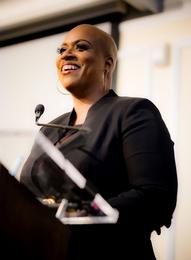
|
|
| Rep. Ayanna Pressley (photo: Nancy Anderson Cordell) | |
After a brief welcome from Jordan Bookey, author and chair of the host committee, Lizette Serrano, v-p of educational marketing and event strategy at Scholastic, introduced Pressley. Like many of the evening's speakers, Pressley condemned the current administration's attacks on diversity and inclusion, rampant book banning, and the focused attacks on bookstores and libraries: "I know I'm preaching to the choir, but I do that because I need the choir to sing."
Pressley shared her experience with one of the most banned authors in the U.S., Maya Angelou, in relation to the evening's theme, Stories Save Lives: "As a young child experiencing interfamily sexual abuse, I thought I was completely alone in the world until I read I Know Why the Caged Bird Sings. I don't know where I would be if that book was not available to me. When I say books save lives, I know it to be true--because a book saved mine."
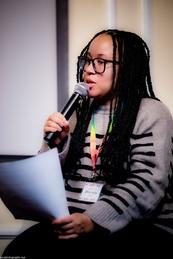
|
|
| Dhonielle Clayton (photo: Nancy Anderson Cordell) |
|
Author and WNDB chair Dhonielle Clayton used Myers's own words from his 2014 New York Times opinion piece, "Where Are the People of Color in Children's Books," to highlight the evening's theme: "Every book was a landscape upon which I was free to wander." Clayton, moderator of the anniversary's panel featuring Hannah-Jones, Reynolds, and Woodson, asked the authors if they remembered the first time they saw themselves in literature. "Stevie by John Steptoe," Woodson responded. "The characters looked like me, they sounded like the people I lived around, and it was an amazing moment. The next book was Roll of Thunder, Hear My Cry." Hannah-Jones said Mildred D. Taylor's 1977 Newbery Medalist was her first as well--"There was a Black girl on the cover and that was the first time I saw a Black girl on the cover." Clayton noted "it was the same for me--it's so interesting how that one book has changed all of our lives."
"Yeah," Reynolds added, "it wasn't that for me. The first book that I saw myself in was The Young Landlords, an older Walter Dean Myers book. I had never read about neighborhood kids doing neighborhood things before that. The real issue is that I was 24 years old when I read that story, and it was the first time I actually saw myself."
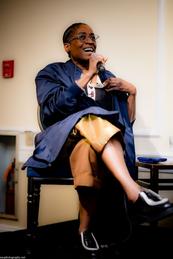
|
|
| Jacqueline Woodson (photo: Nancy Anderson Cordell) |
|
It's not an accident, Woodson said, "it's by design that you didn't come to Walter until you were 24. As many books as he had written? As many awards as he had won? What was keeping those books out of your classrooms?"
Relating back to Pressley's remarks, Clayton asked the panel what they thought "our titans" would say if they were with us today. "They would be cursing," Woodson said. "You think children's book writers don't curse? We curse." Hannah-Jones responded, "I don't think they would be shocked. Those of us who had the luxury of being born after the civil rights movement had the luxury of being surprised. But people who had to fight to have basic rights would not be surprised we're having to fight again. I think they would be angry with all of us for allowing it to get here--we got complacent." Hannah-Jones noted that "about 90% of the book bans came from about 100 people." We are allowing, she said, "the tiniest minority to decide what is being taught in the classroom, to take books out of libraries." Books by Black and LGBTQ+ people are being singled out specifically, she said, and "this is why I say it's psychological warfare: because as a child, when I never saw myself in the history books, in my literature class, in the library, I internalized what that meant. And what that meant was I came from a people who didn't do anything important, who didn't do anything of value, and so I'm not important and I don't have value. You erase us from the curriculum and then you erase our rights."
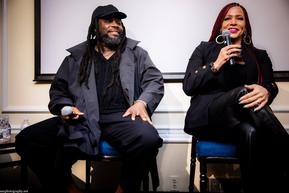
|
|
| Jason Reynolds and Nikole Hanna-Jones (photo: Nancy Anderson Cordell) |
|
While Clayton, Hannah-Jones, Reynolds, and Woodson all worked to keep the conversation about Myers's legacy, there was an understandably somber tone. "This is the worst celebration I have ever been to," Reynolds lamented. "Happy 10th year, y'all." Clayton, graciously moderating, laughed and said, "I'm trying to bring in the joy, Jason. Give me a second to land the plane." So, Clayton asked, "What do we want for readers in the future? What do we want them to celebrate?"
Reynolds said he wants Black kids to get to be "weird." "I hope in 10 years," he said, that Black kids know "they don't have to be the coolest kid or the toughest kid; they can be the strangest kid." Hannah-Jones smiled: "Nobody ever comes to me for inspiration. Y'all, we're in trouble. I can't say we will all survive this moment but what I can say, because I've studied history, is that to be Black in America is to struggle. There has never been a moment since 1619 when we didn't have to struggle. We know how to do it. We always found a way. We will find a way. Ultimately, the future we have is the future we choose." Woodson focused her response on the inevitability and longevity of stories: "We always have story, and we will always have story. We had story when we weren't allowed to read, we had story when we weren't allowed to write. They can't kill the spirit. We came here not meaning to survive and we survived. We thrived. We continue to thrive. There is something about Black and brownness that is here to stay. For me, that's the celebration."
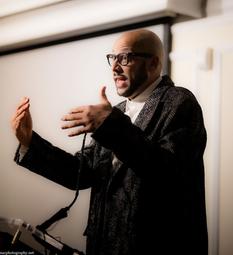 |
|
| Christopher Myers (photo: Nancy Anderson Cordell) |
|
After a tribute to Ellen Oh and her 10 years as WNDB chair, the evening closed with an energetic and upbeat anecdote from Christopher Myers about his father. "I must have been about 11 years old," he said. "I was crossing 14th street with Pop, and he ran into Tom Feelings. Great illustrator. They saw each other with the kind of frequency that old men see each other. We began to cross the street and they both looked back and said, 'Oh no! They coming!' So I began to run. The two adults said 'they coming'--I'm going to run. I found myself in the middle of 14th Street, cars every which way, and Tom and Dad standing on the corner just laughing, knowing that they had got me. Knowing that they had imbued in me the same instinct that they had. Every Black person will tell you that we are all running. White people will be like, 'What are we running from?' But Black people are all going to run together. We find ourselves in this moment right now where, oh no, they are coming... But I hope we can remember in these moments that you can find joy. You can still be standing on the corner laughing as your 11-year-old son dodges traffic." --Siân Gaetano, children's and YA editor, Shelf Awareness

